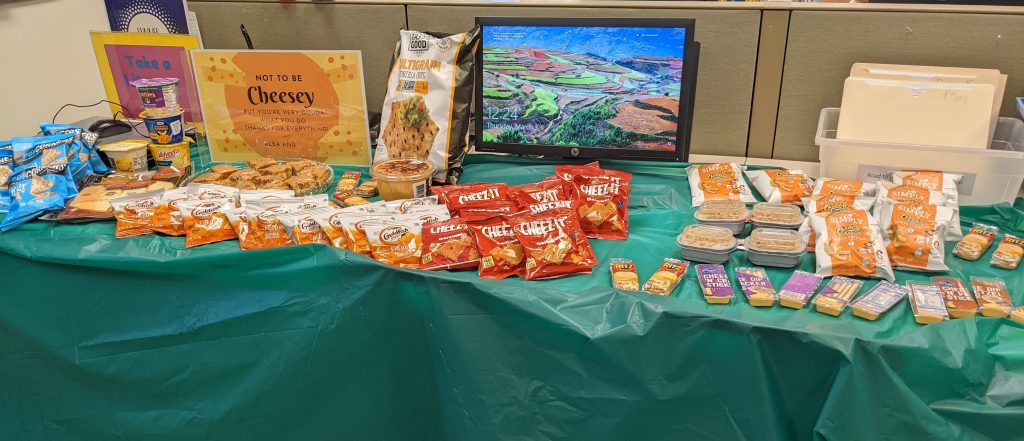Food in the workplace, more often than not, seems to be greatly appreciated by staff as a means of celebrating them or initiatives well done. But it can also be a tricky method for showing appreciation to staff for a number of reasons: inclusion of those with dietary restrictions, sensitivities, and/or needs (medical, religious, or otherwise), inclusion of those who have, or have had, disordered eating issues, financial contribution expectations, etc. However, one of the biggest reasons it can be tricky is due to a common manager and administrative misconception that food in and of itself is a sufficient way to show support and appreciation to their staff. This needs to be stressed: food is not an acceptable or appropriate substitute for supporting staff with increased, livable wages and benefits. Food should always be supplemental appreciation, not the primary or sole.
Before we dive into a few possible themes, let’s turn back to the aforementioned concerns.
Dietary Restrictions, Sensitivities, and/or Needs
Having a diverse workforce means having staff who choose to or need to be careful of what they eat. As of 2018, 5% of Americans identify themselves as being vegetarian while 3% identify as being vegan1 while 21% of Americans in 2015 reported trying to include gluten-free foods in their diet2. When you add in common food allergies such as nuts or dairy, you can see how important exercising caution is, not just for inclusion but for physical safety.
It’s equally important to be aware that multiple worldwide religious and cultural practitioners observe practices/beliefs (such as Ramadan, Lent, the Jewish observation of the Laws of Kashrut, etc.) that may limit what or when they can consume certain foods or drinks.
For all of the above, I recommend creating a quick survey (Google, Microsoft, email, or paper) to administer to new staff (or when you’re new to a staff) asking for their needs and preferences. This can also be useful in learning more about their favorites, which can be gifted to staff for a job well done, birthdays (if they celebrate them), or just as a random “Glad you’re here!”
Disordered Eating Considerations
It should be no surprise to anyone that a society that is as focused on appearance as that of the United States, a whopping 74.5% of women (per a 2013 study) have acknowledged that their happiness has been impacted over concerns regarding their shape or weight3. And this isn’t an issue that only impacts those assigned female at birth.
A lot of diet talk or other body image related discussions can happen at work, particularly around major holidays. For those who suffer from a form of disordered eating, the discussion of food can be triggering at any time of year, particularly if communal food is available and well-intentioned colleagues encourage them to dig in.
Trying to establish a work environment that is as free from food and body image judgement as possible is not easy but it is important.
Staff Contributions
Many libraries enjoy celebrating holidays, birthdays, milestones, and more by throwing a potluck – a meal where staff of all levels in the organization are asked to contribute a dish, drink, dessert, or utensil. While many staff are happy to contribute, it is important for managers and administrations to note that it can be uncomfortable for some staff who are financially or temporally unable to contribute, particular if others are likely to get upset that colleagues who haven’t contributed are still partaking in the treats.
It is my strong recommendation that, whenever feasible, management and/or administration cover the costs of staff appreciation events to avoid discomfort or upset. This also addresses the inequity of lower-paid and part time staff taking on equal cost burdens as those earning higher salaries.
A Few Ideas
Have I completely scared you off from celebrating your staff? I hope not! I simply hope to get across the point that it’s more complicated than many workplaces have considered and if we’re not thinking about and accounting for everyone, we’re not practicing good inclusivity.
There are so many ways to celebrate your staff, but I’m going to share just a few for now.
The first is what I affectionately think of as the Cheese-fest. There is a National Cheese Day (June 4) but you don’t have to save this for then; I didn’t! Below you’ll find the sign I used, as well as a list of the snacks that were provided by myself and the assistant manager of this department.


White Cheddar Popcorners
Goldfish crackers
Cheez-Its
Ritz Cheese cracker sandwiches
Cheesecake squares
Cheese Dip ‘n’ Cracker Sticks
Cheetos Puffs
Macaroni cups including Kraft, Velveeta, and Annie’s Vegan Mac Cheddar flavor
Cheese platter
Plant Based Queso Style Dip (Costco) and tortilla chips
The beauty of this type of appreciation event is how scalable it is. The department I planned this for consisted of 13 non-managerial staff and it took at least three days to work through the majority of these snacks. If you want, or can only afford, to do something small, you can make it as basic as leaving one individual snack for each staff member with a small note.
The second food idea I wanted to share is providing individually packaged cereals for staff. As with a cheese day, you’ll want to be aware of allergies and restrictions to ensure you’re not leaving folks out.

Want to do a cheese or cereal day for your staff? Feel free to download an 8.5″x11″ sign below or create your own!
- Reinhart, RJ. “Snapshot: Few Americans Vegetarian or Vegan.” Gallup.com, Gallup, 20 Nov. 2021, https://news.gallup.com/poll/238328/snapshot-few-americans-vegetarian-vegan.aspx.
- Riffkin, Rebecca. “One in Five Americans Include Gluten-Free Foods in Diet.” Gallup.com, Gallup, 22 May 2021, https://news.gallup.com/poll/184307/one-five-americans-include-gluten-free-foods-diet.aspx.
- Reba-Harrelson L, Von Holle A, Hamer RM, Swann R, Reyes ML, Bulik CM. Patterns and prevalence of disordered eating and weight control behaviors in women ages 25-45. Eat Weight Disord. 2009;14(4):e190-e198. doi:10.1007/BF03325116
